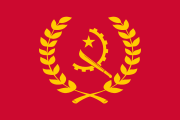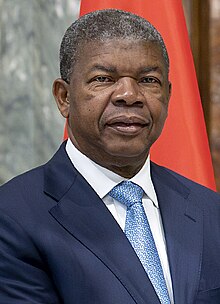| President of Republic of Angola | |
|---|---|
| Presidente de Angola (Portuguese) | |
 Presidential flag | |
since 26 September 2017 | |
| Term length | 5 years, renewable once |
| Precursor | Colonial governor of Angola |
| Formation | 11 November 1975 |
| First holder | Agostinho Neto |
| Deputy | Vice President of Angola |
| Salary | Kz 640,100/US$ 1,263 monthly[1] |
| Website | https://governo.gov.ao/ao/ |
 |
|---|
The president of Angola (Portuguese: Presidente de Angola) is both head of state and head of government in Angola. According to the constitution adopted in 2010, the post of prime minister is abolished; executive authority belongs to the president who has also a degree of legislative power, as he can govern by decree.
The position of president dates from Angola's independence from Portugal. Agostinho Neto obtained the position when his People's Movement for the Liberation of Angola (MPLA) won control of the country from the Portuguese. When Neto died in 1979, José Eduardo dos Santos succeeded him.
Under Dos Santos' leadership, Angola became a multi-party state, although it remained controlled by him. The election held in 1992 reelected Dos Santos with 49% of the votes. His opponent, Jonas Savimbi of the National Union for Total Independence of Angola (UNITA) party, claimed that the election was fraudulent.
As of 2021, there is a two-term limit for the president in the Constitution of Angola. The term limit has not been met by any president yet.[2]
The Angolan president is elected by double simultaneous first-past-the-post voting for the same five-year term as the assembly, renewable once. Each participating party nominates a candidate as top of its list, who must be clearly identified on the ballot paper. The top candidate of the party gathering the most votes is elected President in accordance with the 2010 Constitution.[3][4] The new constitution limits a president to serving two terms, although it does not count the terms served to date, and abolishes the post of prime minister, instead introducing the post of vice-president.[5]
João Lourenço is the current incumbent. He ascended to power on 26 September 2017.
- ^ "Salary of the President of the Republic of Angola rises by 100 euros per month". Jornal de Notícias (in Portuguese). 13 June 2017. Archived from the original on 28 September 2022. Retrieved 30 March 2022.
- ^ Cook, Candace; Siegle, Joseph. "Circumvention of Term Limits Weakens Governance in Africa". Africa Center for Strategic Studies. Archived from the original on 6 May 2023. Retrieved 6 May 2023.
- ^ "Angola's Constitution of 2010" (PDF). Oxford Constitutional Law (Oxford University Press). 6 June 2017. Archived (PDF) from the original on 1 October 2018. Retrieved 27 September 2017.
- ^ "Constituição da Républica de Angola" (PDF) (in Portuguese). World Intellectual Property Organisation. Archived (PDF) from the original on 19 June 2018. Retrieved 27 September 2017.
- ^ "Angola stops presidential polls". 21 January 2010. Retrieved 4 July 2024.
